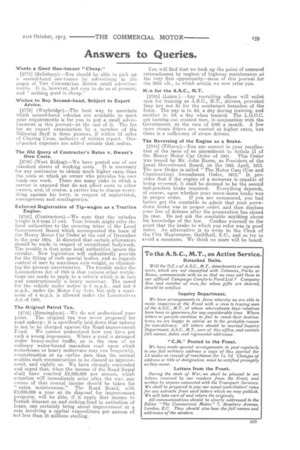Answers to Queries.
Page 19

If you've noticed an error in this article please click here to report it so we can fix it.
Wants a Good One.tonner "Cheap."
[2778] (Salisbury).—You should be able to pick up a second-hand one-tonner by advertising in the pages of THE COMMERCIAL MOTOR small advertisements. It is, however, not easy to do so at present, and " nothing good is cheap."
Wishes to Buy Second-hand, Subject to Expert Advice.
[2779] (Weybridge).—The best way to ascertain which second-hand vehicles are available to meet your requirements is for you to put a small advertisement in this journal—at the end of it. The fee for an expert examination by a member of the Editorial Staff is three guineas, if within 12 miles if Charing Cross, inclusive of written report. Outof-pocket expenses are added outside that radius.
The Old Query of Contractor's Rates v. Owner's Own Costs.
[2780] (West Riding).—We have posted one of our standard sheets of working costs. It is necessary for any contractor to obtain much higher rates than the costs at which an owner who provides his own loads can work. There are many risks to which a carrier is exposed that do not affect costs to other owners, and, of course, a carrier has to charge everything against his lorry, in respect of supervision, management and contingencies.
Enforced Registration of Tip-wagon as a Traction Engine.
[2781]. (Contractors).—We note that the unladen 'weight is 6 tons 17 cwt. Your friends might refer the local authorities to the covering letter ef the Local Government Board which accompanied the issue of the Heavy Motor Car Order at the end of December in the year 1904. It directed that certain allowances should be made in respect of exceptional bodywork. The trouble is that some local authorities ignore the circular. New legislation will undoubtedly provide for the fitting of such special bodies, and as regards control of user by maximum axle-weight, so eliminating the present uncertainties. The trouble under the Locomotives Act of 1898 is that various other restrictions are made to apply to a vehicle which is in fact and constructionally a heavy motorcar. The speed for the vehicle under notice is 5 m.p.h., and not 6 m.p.h., under the Motor Car Acts, but only a maximum of 4 m.p.h. is allowed under the Locomotives Act of 1898.
The Original Petrol Tax..
[2782] (Birmingham).—We do not understand your
point. The original tax was never proposedfor road upkeep; it is specifically laid down that upkeep is not to be charged against 'the Road-improvement Fund. We cannot understand how you have got such a wrong impression. Where a road is damaged undev heavy-motor traffic, as in the case of an ordinary water-bound macadam road upon which motorbuses or heavy motorvans may run frequently, reconstruction at an earlier date than the normal enables such reconstruction to be classed as improvement, and rightly so. We have strongly contended and urged that., when the income of the Road Board shall have reached .22,000,000 per annum, which situation will immediately arise after the war, any excess of that annual income should be. taken for "extra maintenance." The Road Board, with 2,000,000 a year at its disposal for improvement purposes, will be able, if it apply that income to furnish interest on and sinking-fund in extinction of loans, can certainly bring about improvement at a rate involving a capital expenditure per annum of not less than. 16 millions sterling. You will find that we took up the point of unsound retrenchment by neglect of highway maintenance at the very first opportunity—issue of this journal for the 30th ult., to which article we now refer you.
Mn for the A.S.C., M.T.
[2783] (Lancs.).—Any recruiting officer will enlist men for training as A.S.C., M.T., drivers, provided they are not fit for the combatant branches of the force. The pay is is. 2d. a day during training, and, another is. 6ci. a day when trained. The L.G.O.C. are turning out trained men, in conjunction with the Government, at the rate of 1000 a month. A few more steam fitters are wanted at higher rates, but there is a sufficiency of steam drivers.
The Reversing of the Engine as a Brake.
[2784] (Tilbury).—You are correct in your recollection of the issue of an amendment to Article II of the Heavy Motor Car Order of 1904. This Order was issued by Mr. John Burns, as President of the Local Government Board, on the 19th April, 1913. The new Order is-called "The Motor Cars (Use and Construction) Amendment Order, 1913." It provides that if the engine of a motorcar is capable of being reversed, it shall be deemed to be the second independent brake required. Everything depends, of course, upon whether your screw-down brake was in proper order. If you are summoned, you had better get the constable to admit that your screwdown brake was in proper order, and then disclose your line of defence after the prosecution has closed its case. Do not ask the constable anything about his knowledge of the law. Confine yourself to the point that the brake to which you refer was in good order. An ,alternative is to write to the Clerk of the City Magistrates, Guildhall, E.C., and so try to avoid a summons. We think no more will be heard.




















